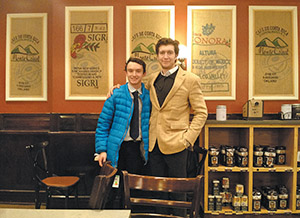
Ari Korman and Andy and Brian Agus, founders of the new start-up SodaScan, agreed to meet with JLNJ’s cub reporter—me—to unravel the enigma that is the SodaScan entity. The idea behind SodaScan is that instead of going out to shop for bulk items (such as 12-packs of soda bottles), you use an app to scan a QR code on a poster you have hanging in your house, and the items are delivered straight to your house or business.
Some of the thought processes and values behind the company that Korman explained are ones that I myself have used or think might be good to adopt. I didn’t expect to get that from a corporation, but Korman and SodaScan are unique.
The company is trying to fill a niche in the community. It’s very hard to have a truly original idea anymore, since so much has already been done. “If we’re just a tech company,” Korman said, “[there are] a million and one tech companies trying to do the same thing. The trick is to figure out something that will make people perk up and realize that you’ve got something unique up your sleeve.”
I suppose that I’ve actually done the same—for instance, when I proposed my column for JLNJ. Had I approached JLNJ with an idea for a political analysis column, or for weekly Divrei Torah, or even for just general humor, I might have just gotten a polite response, but I doubt I would have been published. Why? Because those stories are already in JLNJ. Instead I thought a lifestyle column from a teenager’s perspective would give me a chance to express myself in print. (Clearly, it worked, and I do get a chance to cover stories, too.)
“We very much want this to be a hyper-local, community-driven company. Everything from our marketing to our corporate philosophy, all the way down to our delivery,” Korman told me. “We deal with far too many impersonal services in our lives,” he believes, and that includes services like Amazon, which just mindlessly drop off your packages without any special thought. You wanted help bringing that massive order through your doorway? Too bad. But for SodaScan, he chose a delivery man who was already involved and well-liked in the community as a handyman.
Korman said the man has a personal, friendly touch; he’s willing to go above and beyond to give some extra help and to become a part of people’s lives. I think that’s an important value. I want to have personal interactions with others and be a part of their lives, whether it’s by going out to pizza with some friends on Thursday night or by posting my history notes in my grade’s Facebook group. It’s all about making yourself a valued part of the community you’re involved in.
Another unique fact about SodaScan is that from the get-go, a Ramaz senior, Brian Agus, has been involved. “Brian has been here since the start…building the concept and developing it,” said Korman. Not many teenagers get such entrepreneurial opportunities or participate in budding start-ups. But Korman feels that having young people involved is beneficial to the company, since word-of-mouth can spread to young consumers who also like to buy beverages in bulk along with other items. For those who get the chance to be in business before they graduate they set forth on a great avenue for personal growth and maturity by going through the trials of running a start-up.
While I haven’t been part of a start-up, I had to overcome challenges to pursue initiatives I set for myself. When I worked on a bake sale fundraiser for Israeli victims of terror, I had to learn about a form of retail business on my own, from supply and demand, possibilities of surplus merchandise, to having the right amount of change on hand for our customers. The marketing—designing the flyers and spreading the word—was a challenge, too. But we persevered, and in the end raised a lot of money to help Israeli victims of terror. (I must mention: much of the credit to that goes to Ora Friedman, who stayed and sold items until the very end.)
So there you have it—lessons I learned and values shared with SodaScan. I learned about a company driven by the human touch and ethics—something rarely found in the corporate world.
By Oren Oppenheim











